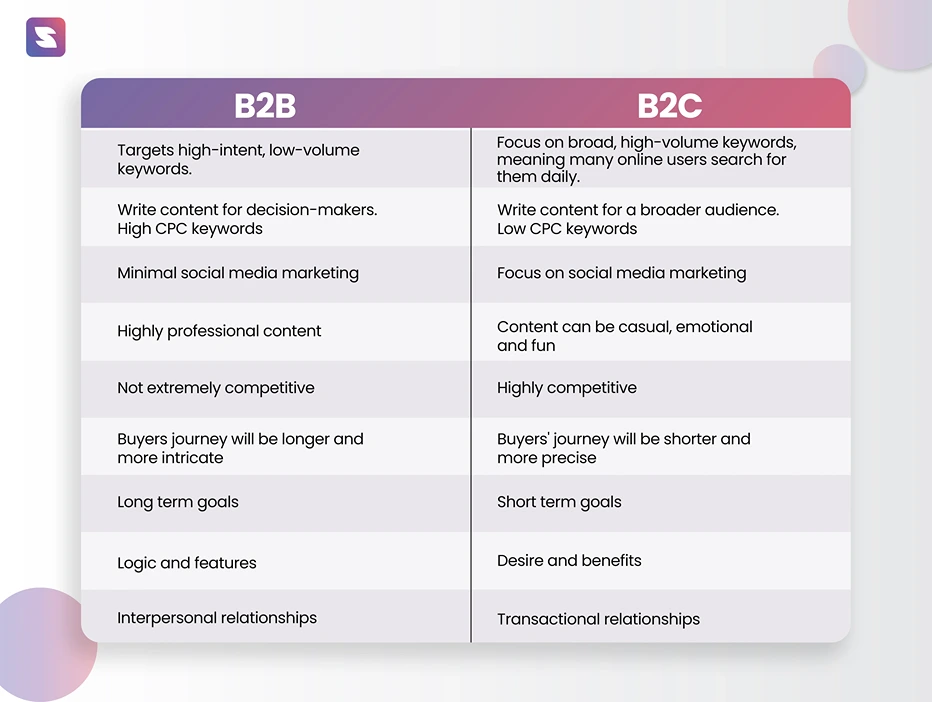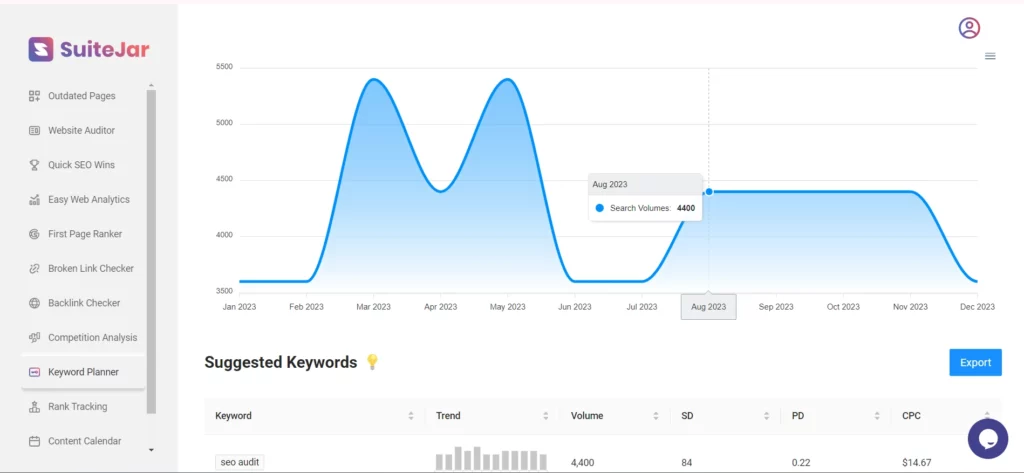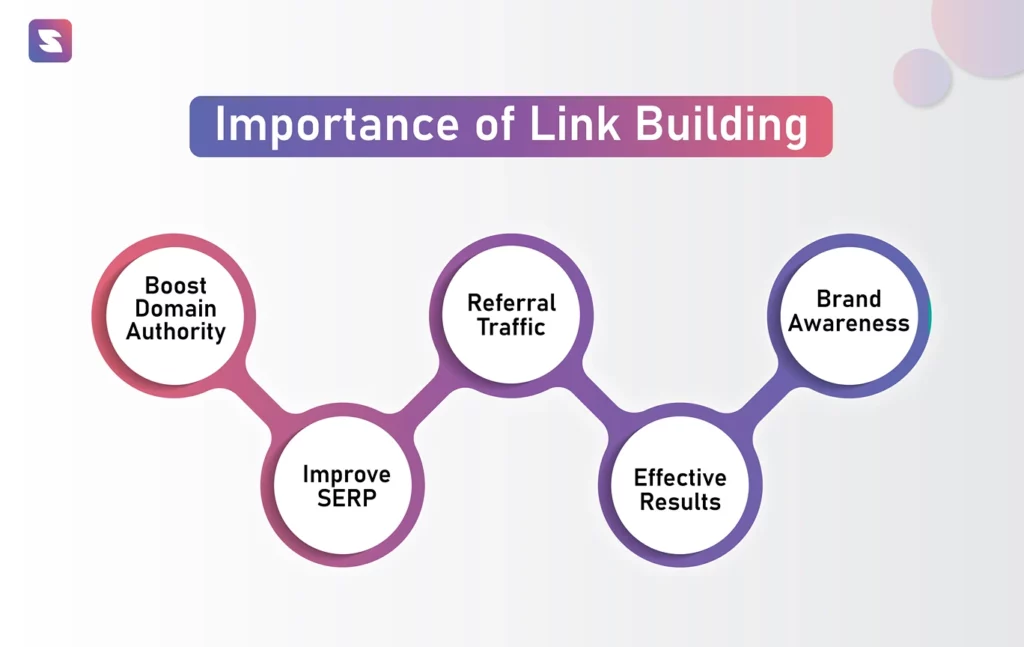Only $99 for a full year!
No credit card required
Rank on Google's first page in 3 months
B2B SEO Strategy: Your Ultimate Guide in 2024
Feb 02, 2024 | prashant@growth.cxSearch Engine Optimization (SEO) has been a practice and industry around for quite some time. People typically consider SEO strategies to position high in popular keyword searches.
However, for business-to-business (B2B) firms, the strategy changes from a broad to a very particular audience.
In this guide, we’ll go about how you can improve your own B2B SEO marketing strategy.
What is B2B SEO?
B2B SEO is the digital practice of reaching out to a company’s decision-makers through various techniques, such as keyword research and page metadata. An effective strategy means that someone who is actively looking for the product or service you’re offering visits your company’s website.
B2B SEO consists of several components. Each one contributes to your overall strategy. If you fall short in one area, it means you still have room to improve your site.
- Technical SEO: These are the changes you make to the foundation of your website. It addresses issues such as your XML sitemap, load speed, responsive web design, and maintaining regular updates for sustained performance.
- Content SEO: B2B content marketing for SEO is the process of creating content based on research on user requirements and search intent. It involves detailed research, brainstorming, content creation based on industry-specific jargon, and strategic promotion.
- On-page SEO: It refers to optimizing the content itself. It encompasses optimizing meta tags and title tags, using alt text on images, and organizing content effectively. A focus on mobile optimization is crucial, ensuring that content is easily accessible and engaging for users on mobile devices.
- Off-page SEO: Having high-quality pages interlink to you on a particular topic, also known as backlinks, increases your apparent expertise in that topic. It also facilitates engagement on the page or post.
- Local SEO: Local SEO strategies can be pivotal for businesses targeting local or regional clients. This process involves optimizing your website for local search terms and ensuring your business is accurately listed in local directories.
- Analytics and Measurement: Regularly tracking and analyzing key metrics such as organic traffic, lead quality, conversion rates, and keyword rankings is essential.
- User Experience (UX): Focusing on UX is vital in 2024 B2B SEO. A user-friendly site that provides valuable information will likely engage your visitors and convert them into leads.
Here, we can look into the difference between B2B SEO and B2C SEO.

What is the Importance of SEO for B2B?
As the internet is nowadays most customers’ first stop for purchasing, it is essential for today’s businesses to have a powerful online presence.
SEO, or search engine optimization, is essential these days since most people use search engines to find what they need and then only tap on the first few results that appear to be the good or service they need.
SEO, or the process of ensuring that your website and content are assisting your business in rising to the top of the SERP, can make or break a new venture. Even those who conduct business in the business-to-business, or B2B, space should consider SEO.
When it comes to the importance of SEO for B2B marketers, there are a few factors to keep in mind. To begin with, B2B search engine optimization will be the foundation of the services that the majority of good B2B SEO tools provide to their customers.
B2B SEO services, on the other hand, should provide a wide range of options like website maintenance, backlink checker, webpage tracker, etc. One of the most vital aspects of operating a website is keeping it up to date, and you can use an all-in-one SEO tool like SuiteJar to optimize your website effectively.
Let’s move on to the B2B SEO strategies.
B2B SEO Strategies in 2024
1. Proper Keyword Research
No B2B SEO strategy can function without proper keyword research because SEO for B2B is primarily concerned with enhancing our content to rank for specific keywords.
Having said that, we should conduct our keyword research using the following guidelines:

- The keyword should be meaningful and well-known among your target group. This is primarily determined by tracking monthly search volume.
- The keyword should be related to your brand and its products/services. Not all keywords that are famous to your target audience will be relevant to your organization.
- Also, the competition for the specific keyword should be manageable based on your provided budget and timeline. The more common the keyword/query, the more intense the competition, so striking the right balance is important.
2. Content Marketing Strategy
B2B SEO is all about content.
Your SEO performance will be limited by the strength of your content, not the other way around. That is, no proportion of optimization will help sluggish, low-quality content rank better on the SERP, but high-quality and meaningful content may rank higher even without any particular SEO optimizations.
How can we tell if a piece of content is ‘good’ for SEO? The key is to focus on how we can deliver value to our intended audience through content rather than pleasing Google and other search engines.
While B2B content creation can be a very broad subject in and of itself, here are some effective strategies to follow:
- Perform a simple Google search for your chosen keywords and look at the first-page results. These are your main competitors, and your job is to create content that outperforms them. Evaluate their structures, flow, duration, and readability, and aim to create something better while keeping your target audience in mind.
- Make sure your content follows a logical structure: introduction, issues, solutions, and conclusions. Make certain that your posts are not promotional in nature.
- Throughout the content, naturally, incorporate your target keywords. Again, concentrate on providing useful information to your human readers.
- Provide external/outbound links in your post to back up your claims and points. Also, remember to link to your own content (internal links) and keep a healthy internal linking composition.
- Remember to include other types of media (images, graphics, charts, and video) to keep your readers interested.
Moreover, even after you’ve created high-quality, meaningful, and complete information, your work isn’t finished, as we’ll discuss below.
3. On-Site Technical Optimization
Another essential aspect of implementing SEO for B2B is making sure that your website and all of its pages are working well so that your audience can use your content with the best possible experience.
On the other hand, you’ll want to ensure that Google and other search engines can rank your site. While technical SEO is a wide topic, here are a few key points to consider:
- Optimize each page for the target keywords discovered during the keyword research stage. Make sure to include the focus keyword in the page’s title/heading, META description, and URL in addition to the body of the content.
- Check that your site’s load speed is perfect. According to Google, if a page takes more than three seconds to load, more than half of users will abandon it. Bounce rate, on the other hand, is now an important B2B SEO ranking factor.
- Check that your website is mobile-friendly/responsive. Remember that an increasing number of people are not accessing websites solely through mobile devices. Again, if your website is not mobile-friendly, it may result in a higher bounce rate.
- Make sure your website uses HTTPS instead of HTTP (SSL certificate); if you’re not using HTTPS, Google may label your site as unprotected, and Chrome may block access to your site.
- Check that Google can correctly index your site and correct any current crawl errors.
- Incorporate structured data markups (schema.org) so that Google can recognize all of your site’s aspects.
To reinforce, keep in mind that technical SEO for B2B has three goals:
- Ensuring that your audience can enjoy your content and use the functions of your website conveniently.
- Maintaining your audience on your site for as long as possible.
- Assuring that search engines recognize your site’s content and all of its various components.
4. Link Building
Backlinks or inbound links continue to be the most direct ranking factor in B2B SEO. But it’s worth noting that the quality of your backlinks is here just as, if not more, essential than the quantity.

So that we can no longer depend on simply obtaining as many low-quality backlinks as possible in our link building, we also know that obtaining high-quality backlinks from well-known sites meaningful to our niche can be more difficult.
So, how do we go about it?
First and foremost, provide a reason for them to link to your content, which we refer to as the link hook. As an example:
- Unique details or information (statistics, research reports, etc.)
- Characteristics that are visually attractive (infographics, beautiful photos, well-designed images, etc.)
- Original stories that are engaging
- Descriptive, actionable suggestions not found anywhere else.
Once again, your content will be important. But even so, regardless of how good your content is, it will be useless if it does not reach anyone. This is why boosting your content is crucial for link building as well as increasing traffic to your content.
Utilize all available marketing channels, such as social media, guest blogging, backlink outreach, and other methods, to build backlinks while also endorsing your content.
You wouldn’t even have to do it manually because there are various automation tools that will complete the task quickly.
That was it; there are only four basic elements to integrating B2B SEO strategy, and while they may appear complicated at first, they’re actually very simple once you’ve gotten the hang of it.
So, rather than overcomplicating our B2B SEO strategy, we should keep things easy and focus only on the crucial components.
When Creating A B2B SEO Strategy, There Are Only Three Major Factors To Consider
i. Audience’s Intention(s)
B2B SEO marketing is only as effective as how well our content and search terms reach our target audience. We can definitely rank for every possible keyword out there, but it won’t help our business if our target audience isn’t looking for them.
So, here, we should concentrate on two points:
- Recognizing our audience through methods such as market research, buyer identity development, and the use of cutting-edge analytics tools, among others. We must learn about our audience’s habits, common issues, and needs, as well as how to address them.
- Research keywords. You will almost certainly need a paid keyword analytics solution (SuiteJar, Ahrefs, SEMRush, and others), and keep in mind that B2B keyword research can be a long, complex, and painful process.
Here are some methods for locating keywords for your B2B SEO campaign:
- First and foremost, explore the keywords for which you already rank (if any), and highlight them if they are valuable.
- Examine the keywords of your competitors. If you can outperform them with relevant SEO content, do so. Check the keywords of publications in your niche as well.
- Sort keywords based on their intent. You might be able to reach out to several of them with a single piece of content.
- Think about the competition. The “keyword difficulty” metric is provided by the majority of keyword research tools.
- Remember that in the B2B world, relevance is more essential than search volume.
ii. How to Provide Value-Based on These Intentions?
How can we meet the needs of the target audience now that we know what they want?
In a nutshell, this site is about content and giving information. Create a content calendar. Keep in mind that SEO for B2B businesses is a long-term game in which you must maintain reliability in both quantity (how frequently you publish) and quality (maintain high relevance and value).
You have two options for each keyword you want to target:
- Develop content that is noticeably superior to that of your competitors (the top-ranking pages)
- Look at it differently and try a different approach to the topic from a different perspective. To summarize, be unique.
That’s all there is to it, and once again, don’t unnecessarily complicate things.
iii. How Can We Convince the Search Engines?
These are the two things that will convince the search engine:
- Google and other search engine’s ability to recognize and index your site (technical factor)
- How many websites link to yours, and are there any meaningful sites linking to yours? (backlinks quality)
The first is primarily about technical enhancement, and you may want to start with this technical SEO checklist.
Although there are numerous strategies for obtaining backlinks, the correct strategy is to have useful content linking. If your content is great and appropriately promoted, you’ll eventually get those beneficial links to boost your B2B SEO strategy.
Final Thoughts
No business can thrive unless it actively positions its content in search results. Increase your search visibility to bring in more visitors and, as a result, conversions and sales. And it’s well worth the time and effort to become an SEO expert.
You need SEO tools to provide the right details to the right audience at the right time. Consider SuiteJar, an affordable SEO tool that provides all the features you require for B2B SEO.
It helps in the establishment of your business as a credible source, the generation of leads, and, finally, the increase of sales.
FAQ
1. What is B2B SEO?
B2B SEO is a digital marketing strategy primarily focusing on enhancing the online visibility of businesses targeting other businesses. It involves optimizing website content, keywords, and online presence to attract and engage B2B audiences.
2. What is the difference between B2B SEO and B2C SEO?
B2B SEO targets businesses and emphasizes longer sales cycles, relationship-building, and industry-specific keywords. B2C SEO, on the other hand, focuses on consumer-oriented keywords, shorter sales cycles, and mass-market appeal.
3. What are B2B SEO keywords?
B2B SEO keywords are specific terms and phrases relevant to business-to-business interactions. These keywords often include industry-specific terms, product names, and words used in professional contexts to attract a B2B audience.
4. How do you create a B2B SEO strategy?
To create a B2B SEO strategy, identify your target audience, conduct keyword research, optimize website content, create valuable and shareable content, build backlinks from reputable sources, and monitor and adapt to industry trends.
5. What are the best B2B SEO tools in 2024?
The top B2B SEO tools in 2024 include popular platforms like SuiteJar, Ahrefs, SEMrush, and Moz SEO Tool. These tools assist in keyword research, competitor analysis, backlink tracking, and overall performance monitoring to enhance B2B online visibility.
4 Comments
kütahya günlük apart daire says
2024-10-27 14:46:30kütahya günlük apart daire kütahya günlük apart daire
istanbul boナ歛nma avukatトア says
2024-10-24 14:44:14istanbul boナ歛nma avukatトア istanbul boナ歛nma avukatトア
toptan vozol says
2024-10-20 23:57:21toptan vozol toptan vozol
MasumINTL.Com says
2024-09-03 07:45:32MasumINTL.Com [...]The info talked about within the article are a few of the most effective offered [...]

